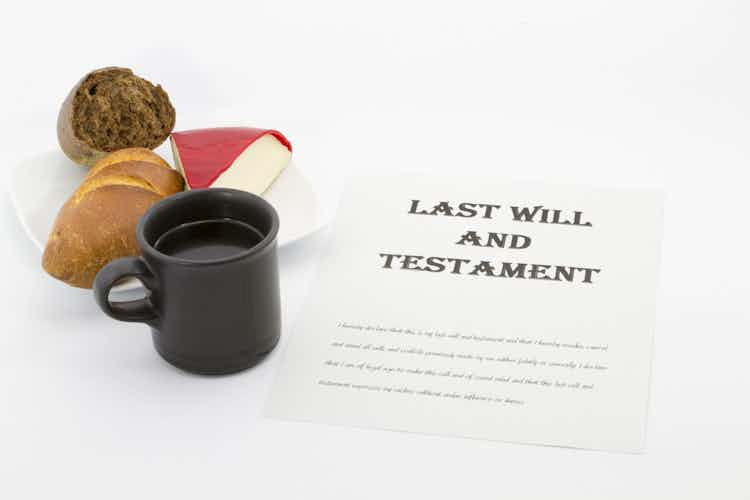Writing a will may not be top of your to-do list. According to the IRN Wills and Probate Research Report, having this legal document is not a priority for many Brits. Their research found only 4 in 10 UK adults have made a will. However, having a will allows you to control what happens to your estate, reduce stress on your next of kin, and can help to make your funeral arrangements or wishes clear.
You spent much time gathering your possessions, making investments, and earning money. Most people want to have a say in what happens to it all after they pass. When the time comes, you want to guarantee that the people, causes, and charities you care about the most benefit from the fruits of your labours. Estate planning is essential and helps you consider how you’d like to divide your money and possessions.
Knowing what you want to put in your will might sound easy. But are there things you shouldn’t put in your will?
Four items to never include in your will
Complications with a will can lead to trouble and arguments between loved ones. After a person dies, their estate goes through a legal process that can take weeks or months, even without significant problems. If things in your will complicate this legal process, your loved ones might have trouble sorting out your financial obligations and settling your estate.
So, what should you avoid including in this legal document? These are things you should never have in your will.
Things you don’t own
Although this may sound obvious, you shouldn’t include things you don’t own in your will. You cannot gift items you don’t have, so ensure you only include things you have full ownership of. For example, leased vehicles or rented purchases should never be in your will. High-value items or phones on contract could also be items you don’t fully own; therefore, you can’t include them either.
Joint accounts and jointly-owned items
As we covered in the last point, you can’t include things you don’t own alone. If you have a joint bank account, the funds will always almost go to the surviving account holder. Therefore, you can’t decide to gift it to another person.
The same principle applies to jointly owned property. If you own property with a spouse or a friend, you cannot gift it to someone else. Most married couples and people in a civil partnership tend to be joint owners with their partners. In these situations, the ownership will transfer fully to the person you own the property with. This situation applies to most, but not all, types of property. If you share property as ‘tenants in common’, your share passes to your estate.
So seeing as you cannot gift things you don’t fully own to anyone else, you also don’t need to mention jointly owned items in your will. If you have a property with your spouse, you don’t legally need to make a mention of ‘leaving’ it to them. The law states your spouse will be the new owner, and mentioning it in the will can complicate things, even though the recipient is legally correct.
Possessions and investments with beneficiaries
Your will shouldn’t ever have a list of assets with designed beneficiaries. So, for example, if you have life insurance with an assigned beneficiary, you don’t need to mention it in your will. You also can’t change who the beneficiary should be in your will.
The same principle applies to things like pension benefits. These typically transfer to your spouse. If you’re not married, then you might have another designed beneficiary.
Overall, going through any investment schemes and checking who the assigned beneficiary is is a good idea. In some cases, this might be your estate. If so, you could set the benefactor in your will.
Business partnerships
Finally, you should not include any business partnerships in your will. What happens to your share of the business generally requires agreement by the remaining partners. You cannot state in your will what you want to happen without the business partners having a say, as they could disagree with the decision.
Avoid these mistakes in your will
The above four items are things you should never include in your will. However, there are also a few other things worth mentioning. While these might not be complete no-go things in terms of legality, they could cause problems, one way or another.
You may want to avoid discussing the following things when writing your will.
Funeral arrangements
There is nothing wrong with having a say in how your funeral’s arranged. You should consider what type of funeral you want and how you will pay for it all. But you should avoid stating your funeral wishes in your will.
Your will won’t be the first thing people deal with after you die, as wills are often looked at and read out weeks after the funeral. Stating your funeral arrangement plans in the will is a bad idea if you want your loved ones to follow them.
Instead, you should consider making a separate funeral plan and discussing it with your loved ones. This way, you can guarantee that your wishes for your funeral are understood and followed.
Conditional gifts
Sometimes it is tempting to attach conditions to gifts. Perhaps you want the grandchildren to finish their degrees before they get a monetary donation from you. You could even ask your son to divorce that daughter-in-law you’ve never liked before your beloved Mercedes-Benz is theirs!
While you are free to make suggestions and state your opinion in your will, you don’t have any guarantees these will happen. You’d need to pay an executor’s fee to enforce your wishes. Therefore, it’s much nicer to talk about your wishes with your loved ones in advance.
For example, you could suggest that your favourite watch goes to your grandchild when they marry. But it is important to remember that these are personal suggestions, and enforcing wishes can be complicated.
Gifts for pets
A dog is often a man’s best friend, but they can’t own things like property. You can’t assign property to your beloved pet under any circumstances.
What you can (and should do) is assign your pet’s care in the will. Doing so gives you peace of mind to know your pet will go to someone you respect to take good care of your fluffy friend. However, make sure to talk about this wish with the person beforehand. You can’t force anyone to care for your pet if they don’t want to, and it’s always best to discuss things before it’s too late.
You can also set aside money to donate to an animal charity. You can also use your will to assign an investment to a charity or particular organisation.
Do you need a will?
When you die without a will, you will die ‘intestate’. Intestacy means your estate will follow special rules determining its distribution. Usually, your surviving spouse and dependents receive most of the estate. But other more distant family members could also get a part of your estate.
The main thing to understand is that without a will, your estate might go to people you don’t want it to. So while you don’t technically need to have a will, writing one will give you plenty of peace of mind.
How to ensure your will is legal
It’s essential to ensure your will is legal. You can’t simply sit down one day, write your wishes on paper and expect it to become a legal document. Of course, you can note your wishes and how you want your estate distributed, but certain things make a will legal.
Your will is valid if:
- It’s in writing, signed by you and two witnesses.
- You and the two witnesses signed it at the same time, with everyone present in the room.
- Your witnesses aren’t beneficiaries of the will or the spouses or civil partners of those beneficiaries.
- You wrote it with full mental capacity, and you understood the effects it would have.
- You wrote it voluntarily and without any pressure from anyone else.
If it all seems a bit daunting, don’t worry! You don’t have to write your will without legal advice. You can visit a solicitor and have them write your will for you. There are also will writing services and plenty of online resources to guide you. The most important thing is that you start thinking about your will and draft one to protect your wishes and your loved ones.
Law Society of England and Wales President Lubna Shuja told Pension Times: “Many people are unaware of the stress and strain they can leave behind if they do not make a Will or regularly update one to reflect their current wishes. We encourage those who haven’t yet done so to put their affairs in order. Writing a legally valid Will with an expert solicitor ensures people’s estates are inherited exactly as they would choose. It can prevent a whole raft of problems landing on loved ones at a time when they are grieving. If you choose to write your own Will, it is strongly recommended that you have it checked by a solicitor to make sure it is valid and achieves what you intended.”
What if your will is incorrect?
If you’ve read this post and suddenly remembered you’ve left your shed to your pet chickens, don’t fret! You can review your will and ensure you don’t have the above items included. If you do, you can always rewrite your will. You can make alterations, which are called a codicil, or nullify the old version entirely. You need to ensure you mention in the new will if you are cancelling an existing one so there is no confusion.
You can also ask a solicitor to look at your existing will. They can give professional advice regarding the will’s validity and propose any amendments that they deem necessary.
Things to never put in your will
Thinking about death or our loved ones’ mortality is not the nicest of things to do. But it’s important to share our wishes with those we value the most. It can help ensure people know your deepest wishes when you are gone and can even help your friends and family with their healing process.
Writing a will is an excellent way to ensure your possessions and money are divided the way you want. You’ve spent a lot of time earning them and should get a say on what happens after you’re gone.
When writing your will, you want everything to be as it should be. Complications and errors can cause issues and lengthen the process of dealing with your estate. By understanding the items you shouldn’t include in your will and taking the necessary steps to ensure everything is correct in the eyes of the law, you can make the process as smooth as possible.







